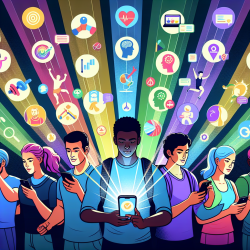Introduction
With the rise of mobile technology, innovative solutions are being sought to address the pressing issue of physical inactivity among university students. The study titled "Ratings and experiences in using a mobile application to increase physical activity among university students: implications for future design" provides valuable insights into how practitioners can enhance their skills by leveraging mobile applications to promote physical activity and mental health among students.
Understanding the Research
The study involved 103 university students using a mobile app called 'DIAMANTE' for six weeks. The app aimed to increase physical activity through motivational text messaging and step tracking. Participants provided feedback on the app's effectiveness, focusing on the perceived encouragement and support offered by the app, the content of text messages, and recommendations for future applications.
Key Findings
The research highlighted several critical insights:
- Personalization is Key: Participants emphasized the need for messages that are tailored to their motivations, daily context, and mental health status. Messages that were not contextually relevant or personalized were often perceived as ineffective.
- Positive Framing and Concrete Feedback: Messages that highlighted the benefits of physical activity for mental and physical health, and provided concrete feedback on activity levels, were well-received.
- Challenges with Generic Messaging: Messages that did not align with individual motivations or were perceived as discouraging were less effective.
Implications for Practitioners
Practitioners can enhance their skills by incorporating the following strategies based on the study's findings:
- Embrace Personalization: Develop interventions that adapt to individual needs, motivations, and contexts. This could involve using machine learning algorithms to tailor messages effectively.
- Focus on Mental Health: Recognize the dual benefits of physical activity for both physical and mental health. Tailor messages to address mental health concerns and provide support for students experiencing stress or depression.
- Provide Concrete and Varied Feedback: Offer detailed feedback on physical activity levels and suggest diverse activities beyond walking to maintain engagement.
Encouraging Further Research
While the study provides valuable insights, it also highlights the need for further research to refine mobile app interventions. Practitioners are encouraged to explore:
- Advanced personalization techniques using machine learning and artificial intelligence.
- Integration of mental health support within physical activity apps.
- Longitudinal studies to assess the long-term impact of mobile interventions on physical activity and mental health.
Conclusion
By leveraging the insights from this study, practitioners can improve their skills in designing effective mobile interventions that promote physical activity and mental health among university students. Emphasizing personalization, mental health support, and concrete feedback can enhance the effectiveness of these interventions.
To read the original research paper, please follow this link: Ratings and experiences in using a mobile application to increase physical activity among university students: implications for future design.










